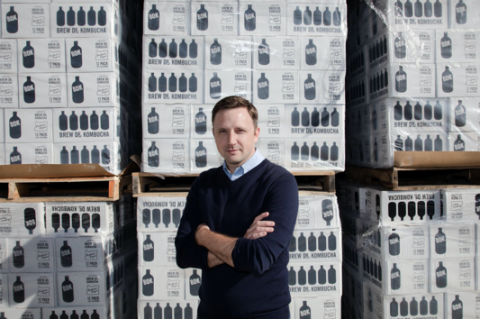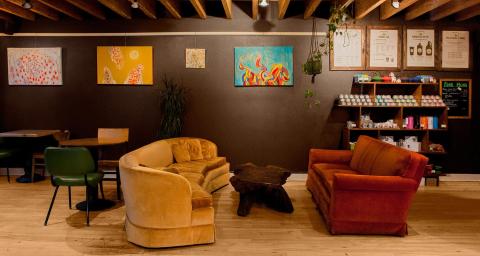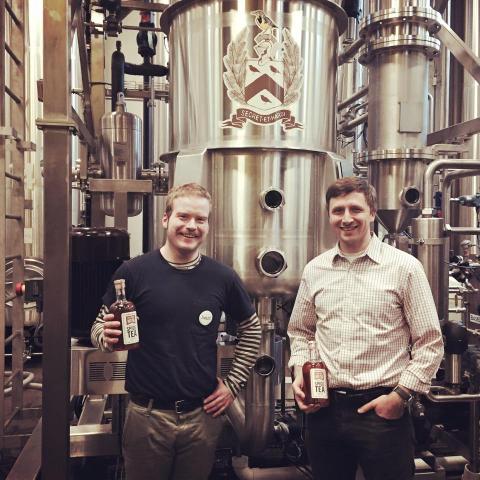
Ever since childhood, Matt Thomas was into recycling. It was just part of his life in Portland, Oregon and he’s carried that mindset into his businesses: Brew Dr. Kombucha, Townshend’s Tea Company and Thomas & Sons Distillery, aiming where possible to have as little impact on the environment as possible, as well as align with a charity that brings the fascinating world of science to school kids, through Ecology in Classrooms and Outdoors.
His business actually grew organically, if you will. When he attended the University of Oregon for business, in his senior year in 2002 one of his class assignments was to come up with a business concept that was underserved. He chose tea — the most consumed beverage in the world, next to water, despite our preoccupation with coffee shops.
Inspired by his late granddad’s love of the beverage, he created the business model for a teahouse. Four years later, it came to fruition, when he opened Townshend’s Tea Company, featuring over 100 varieties of lose-leaf tea. Two years later, a second location. In 2012, after selling the product in-house, he formed Brew Dr. Kombucha, an organic bottled tea-based drink sold in the U.S. and Canada; and the new tea-based spirits company, Thomas & Sons Distillery.
Thomas now employs over 150 people across his three tea-focused companies, including eight retail tea houses in the Pacific Northwest. Brew Dr. Kombucha — 100 percent raw, Non-GMO and USDA Certified Organic that comes in nine flavours — is sold in over 35 states and across Canada, including retailers like Costco, Target, select Whole Foods, Natural Grocers and Sprouts. And Thomas & Sons Distillery is available in Oregon and Washington.
Samaritanmag talked with Thomas about starting a business with these principles and how it might impact the bottom line and customer loyalty.

Absolutely. It’s just a by-product of growing up in Oregon. I maybe took it for granted, but Oregon’s been at the forefront of recycling programs and sustainable energy production, so it comes along with growing up here. Also, my wife and I are very likeminded in that we care about the sustainability of the environment, where we want to raise a family. It’s important. It seems like a forgone conclusion right, but then it should just be important to everyone. So it’s always been second nature. When I opened the first teahouse, we got the City of Portland BlueWorks [business recycling] program and we were given an award by the City of Portland for sustainable small business practices.
Do you know how Oregon came to be at the forefront? Was it championed by a politician or company?
That’s a good question. Oregon had one of the first bottle bills in the country, as far as charging you 5 cents deposit and getting 5 cents back, back in the 80s I believe [Ed: The Oregon Bottle Bill was passed 1971, the first in the U.S.] I don’t quite date the exact year, but I know that the Oregon Bottle Bill was very much a pioneering piece of legislation that is now in most states, to charge a deposit and encourages recycling of containers. That was the beginning and then there was found to be this whole industry around recycling, where were all these household goods that were thrown away were actually able to be turned into other profitable businesses.
When you were living at home, was that part of your everyday family life?
Yeah. My chores as a kid was to bag up all the newspapers and put them on the curb once a week because there was the newspaper recycling, or we would even take them to a place where they would weigh how much you had and give you amount of money per pound of the newspaper. And we would collect all the bottles and cans; my parents were soda drinkers so that meant a lot and we returned those to the grocery store. That was part of my upbringing. You didn’t just throw things in a bin, then make them disappear in a garbage truck.
In university, how did creating a teahouse enter into your school work?
I only have an under grad degree, a double major in business and Spanish. The business degree is obviously what I’ve made use of. The teahouse concept was an idea I generated in my senior year at the University of Oregon [2002]. We were tasked with the job of creating a business plan for a new business that served an underserved niche market. My idea was the tea, when compared to coffee, was greatly underserved. Coffee had really found its base in the community, as far as the growth of coffee shops everywhere, but tea was still a tea bag product.

It definitely got more important as far as being a part of the curriculum, I noticed, because I get asked to go back and speak at the University of Oregon and they have a Masters in sustainable business practices program now, which they didn’t have when I was there. So, no, I don’t think it was part of the business curriculum. I don’t recall taking a corporate responsibility class or anything like that. But, again, it was a by-product of this evolving mentality of care for the environment, care for sustainable practices, care for community and social justice you’re seeing resonate much more nowadays through the B Corp movement [for-profit companies certified by the nonprofit B Lab to meet rigorous standards of social and environmental performance, accountability, and transparency] It’s one of those things, along with “Non-GMO” and “Certified Organic,’ over the years that it’s becoming as important of how you do business, not just of what you do as a business.
The materials with Brew Dr. Kombucha highlights the company’s support of ecology in the classrooms, using renewable energy, non-toxic cleaning products, responsible waste disposal, compostable byproducts. Were those initially part of your original teahouse?
No. We started making kombucha in 2008 when we had two teahouses. We were already actively recycling everything we could at the teahouse and promoting people to dine in, to have their beverages in for-here containers, rather than to-go cups whenever possible. We were paying for wind energy, rather than just your standard from the electrical utility; you pay a little premium when you’re buying wind-generated energy. Out here in Oregon, that’s how they do it. When we started making kombucha, and we started to grow and grow, we came back to the fact that we care. Again, it was second nature, as we grew to try to put things in place that mirrored, through the kombucha effort, what we were already doing at the teahouses, which is that outward effort of care for sustainability and for the environment.
So from early on we’ve supported this nonprofit Ecology In Classrooms And Outdoors. As far as who to give to, that one really resonated because I’m a firm believer that education is the key to empowering the next generation. What this group does is they go into grade schools and they take outdoor science curriculum into the classroom, which kids are not really getting now. Just through learning about their local habitat, it makes them care about it because there’s all this cool outdoor science around them that they aren’t exposed to otherwise. What we are talking about is “When the rain falls, where does it go?” And then farming and fertilizers how that impacts the watershed and that comes back to bugs and fish and wildlife.
You mentioned earlier that wind energy costs a premium. That often prevents businesses, especially small businesses or startups, from doing these things. They have to weigh the cost of being principled.
Again, it comes back to this new mentality around doing business right. It’s B Corp mentality of not only caring about maximizing profit, but in making a profit using the business practices as a way to have a positive impact and to support positive efforts. So early on at our teahouses, we switched from regular milk to put in our chai lattes to organic milk. Yeah, it costs twice as much, but our customers mostly had the same mentality as us. That matters. You know that that milk is been produced in a way that supports organic agricultural and organic farming.

Yeah. You definitely should tell people about it right, when you’re paying more, because you believe it’s the right way to do business. You want to tell people about it because people care about that. I certainly care about seeing the organic symbol on a product. We just signed on with 1% for the Planet [a network of more than 1,200 member businesses, numerous individuals, and thousands of nonprofit partners in more than 40 countries that has donated more than $150 million to environmental nonprofits to date]. When we see that logo on products, I know that that’s very meaningful because they’re factoring into their bottom-line this committed donation to nonprofits that do activities that benefit the overall health of the planet.
So that’s something that we recently signed for because as we grow we really need to cement these things that we care about, that we kind of just done because we’ve been a small business and we’ve been very lean and we could just make quick decisions and donations. Now we have to formalize it, so starting a relationship with 1% for the Planet, going through B Corp certification, which we are doing right now, those are ways of, as we grow, showing all of our employees and showing our customers that we’ve signed on for the long-term.
How do you let the consumer know? Not everyone knows what these symbols mean.
You don’t want to be overly braggy about it right. Using the symbols on your marketing materials on your packaging, a little bit of point of sale materials, in newsletters and social media is a great way to talk about the partnerships that you’ve made and that’s where a lot of your biggest fans are anyway, but I don’t look at it as something we have to absolutely try to capitalize on. That side of it will work itself out. We should go to the effort of promoting it in a way, but again just doing it in an effective, yet tasteful way, and not constantly banging the drum because you don’t want to look that you’re only doing it for the marketing side of it.
Yours is a great success story and growing. For others trying to set up a business that is responsible and ecofriendly, what is the trial and error advice you can pass on?
The advice I give to a lot of entrepreneurs is you’ve got to decide what kind of a business you want to run and you probably just know that in your gut right. So in order to enable you to make some of these decisions easier, you really just have to make sure that you’re making enough money right, that you are charging enough for your product to have a profit margin that allows you to incorporate these practices into your bottom-line, into your cost of doing business. Sure, there’s a marketing side that certainly adds value, but not always measurable. So I think small business people, a lot of times, sell themselves a little short; what they’re making they’re putting all of their passion and hard work into and sometimes I just tell people that you’re not just charging enough right?
That’s what it comes down to. What you’re making is small batch, artisan, super, hyper local and the fact that you care about the way you go about sourcing what you are making, all of that has value. So I always tell entrepreneurs to really analyze their profit margin because that’s what’s going to enable them grow. They should be making money on their products and in order to grow a really cool business that they can pour their values into — again, at the end of the day, it has to be a business and has to make money to enable that. I’m very encouraged by all the businesses that are jumping with the B Corp movement.
Patike – Nike Air Jordan, Premium, Retro Klasici, Sneakers